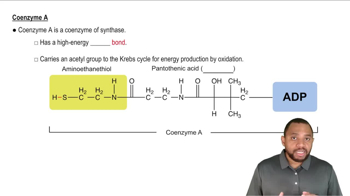The cofactors NAD+, Cu2+, Zn2+, coenzyme A, FAD, and Ni2+ are all needed by your body for enzymatic reactions.
a. Which cofactors are coenzymes?
 Verified step by step guidance
Verified step by step guidance Verified video answer for a similar problem:
Verified video answer for a similar problem:


 2:23m
2:23mMaster Intro to Coenzymes Concept 1 with a bite sized video explanation from Jules
Start learning